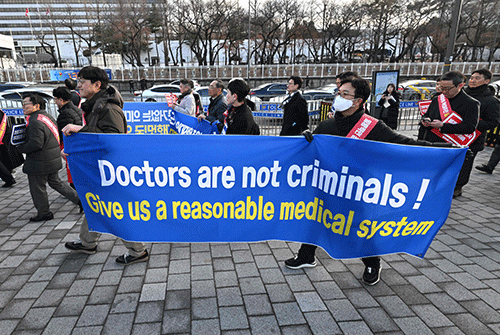SEOUL –South Korea yesterday called for trainee doctors to return to work, warning that they could face prosecution if they do not return to hospitals in the next three days, as protests over medical reforms entered a second week.
Official figures show more than 10 000 junior doctors, which makes up 80.5% of the trainee workforce, have resigned as part of a spiralling industrial action against government plans to sharply increase medical school admissions in the face of shortages and a rapidly ageing society.
The mass work stoppage has resulted in cancellations and postponements of surgeries for cancer patients and C-sections for pregnant women, with the government raising its public health alert to the highest level over the fallout.
Doctors are considered essential workers in South Korea, and are restricted by law from striking. The government has repeatedly claimed the mass resignation is unlawful.
As of yesterday, 9 006 trainee doctors had not shown up for work, and the government warned that legal action, including prosecution and the suspension of medical licences against those on strike, will soon be “inevitable”.
“Please return to your workplaces by the end of this month, 29 February. If you return to the hospital you left by this date, you will not be held responsible for the past,” Second Vice Health Minister Park Min-soo told a press briefing.
Park warned that those who fail to return to work will have their medical licences suspended for at least three months, noting that this measure would remain on their record and might affect the junior doctors’ future career prospects, including overseas employment.
“It is not too late, so please return to your patients immediately,” he urged.
Hospitals across the country have struggled with a shortage of doctors in the past week, with local media reporting that more doctors, including fellows and even fresh medical school graduates, were joining the protests.
Seoul says it has one of the lowest doctor-to-population ratios among developed countries, and the government is pushing hard to admit 2 000 more students to medical schools annually, starting next year.
Doctors have voiced fierce opposition to the government’s plan, maintaining it would hurt the quality of service.
Proponents of the reform say doctors are mainly concerned that the reforms could erode their salaries and social status.
Junior doctors say the reforms are the final straw in a profession where they already struggle with tough working conditions. They also argue that the over-reliance on trainees in the current healthcare system is not reasonable or fair.
But polls suggest that up to 75% of the South Korean public supports the increase in medical school admissions, with those living in remote areas struggling to access quality healthcare.
An editorial carried out by the country’s Chosun Ilbo newspaper said a “significant increase” in the number of medical school students was “inevitable”, adding that the issue should be resolved through dialogue.
“Doctors will know better than anyone else the reality of a shortage of medics. Putting the patients in jeopardy because the scale of the increase is more excessive than they expected is unacceptable,” the paper said.
The doctors were denying the “purpose of their existence” by refusing to treat their patients, it continued, adding: “The trainee doctors must first stop collective action”. -Nampa/AFP


